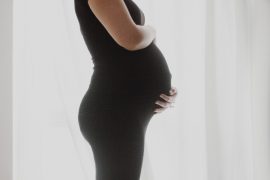It is, of course, a matter of personal preference how and when anyone divulges a pregnancy. I’ve told my closest girlfriends and my family, and I’m fortunate in that I could tell others without real social stigma, if I wanted to - many women need or want to hide their pregnancies in order, if not to keep their jobs, then to continue to fit in at work. A friend who works for a big-city police department forced herself, despite horrible nausea, to hang out in bars with her colleagues because it was part of the culture of her job and her absence would be a signal she wasn’t ready to send. She emptied beers in the bathroom and filled them with water.
But even in less extreme cases, the idea that you’ll keep early pregnancy hidden is an expectation, a norm. These first few weeks, I’ve felt obligated to cloak myself in a veil of secrecy and silence - a silence that is self-created, but culturally mandated. On the simplest level, I would like to not hide how sick and tired I feel and to not lie about why I’ve cancelled so many plans. I can’t pretend to have the stomach flu for three months. I would also like some help: the hard-earned advice my mom friends have given me (eat crackers in the middle of the night when you get up to pee; keep juice and yogurt by the bed) has been more valuable than anything I’ve read in a book or have heard from my doctor, but I feel like they are passing me these secrets under the table while no one is looking. Who knows what the other legions of mothers would tell me if I could ask anyone I wanted without worry?
These first few weeks, I’ve felt obligated to cloak myself in a veil of secrecy and silence – a silence that is self-created, but culturally mandated.
I don’t want to imply that pregnancy is terrible, or that we should encourage it to take over our lives. But the first-trimester charade is isolating, and sometimes insulting; one Pregnancy App tried to teach me how to “have morning sickness in public: Pretend you’re looking for something deep inside your purse-then snap it shut and discard.” Why does early pregnancy have to be a stiff-upper-lip acting job? Can’t it just be a big fat announcement of a wondrous and difficult biological truth?
I wonder whose anxiety we’re trying to protect in concealing these first few difficult months. Is this supposed to be for my sake? Are we trying to protect me from the embarrassment of admitting that I can’t go 45 minutes without eating and am gaining weight at a rapid clip? That I spend most of the day crying and moaning on the couch, Alicia Florrick my fictional companion? That I’m afraid of losing the pregnancy but can’t fathom that this debilitating state of being has anything to do with an actual baby? Are we really trying to save me from having to share the news if I have a miscarriage? Or are we trying to protect our culture from admitting that not all pregnancies are beautiful and easy and make it to term, and that the loss can be absolutely devastating?
As we all know, people say the most careless things to women who’ve miscarried - usually to the tune of “you’ll have another one” or “you weren’t even that far along.” Our fear and unease around death - especially when it comes to babies - is bottomless. When my mother lost a baby girl at 23 weeks a year after losing a boy around the same gestational week, the doctor wrote in her file, “Mother in good spirits.” I wonder if this would happen if we were more honest about the reality of being pregnant, or not being pregnant anymore.
The most alarming thing I’ve heard from friends who’ve had miscarriages is their surprise (only upon miscarrying) at hearing about how many of their friends, aunts, cousins, sisters, mothers and grandmothers have had them, too. If miscarriages are so common, why do we hide them behind a wall of shame and silence? If women could announce their pregnancies immediately, wouldn’t we learn that a pregnancy is truly awesome and terrifying and precarious and unknown - that anything can and does happen, and that women deserve all the love and support and understanding that comes with the act of trying to make another human being?
Of course none of this is simple. I’ve had these thoughts for weeks, but it is only now - at the magical 13th week, after seeing what looks like an actual baby with arms and legs and a heart dancing around in my very own body - that I’m willing to air this beyond private conversations among friends. I could blame the nausea that has had me pinned to “The Good Wife” (ironically) during most of my waking hours, but I know that it’s more than this, and that perhaps I am no different from anyone else who wants to keep part of her life - the momentous, nascent part - to herself. Given my mother’s experience, I’m not sure whether I’ll ever feel that this pregnancy is “safe.” I, too, fear having to retrace my steps with heartbreaking news. I, too, want some semblance of control over who enters this sphere of my life. Women’s choices so often tread a very thin line between the private and the public, and it is perhaps because these first few months can be private - unless you’re royalty - that we try, even at great sacrifice, to keep them this way.
Originally published at Archipelago on Medium.
Abigail Rasminsky has written for The New York Times; O: The Oprah Magazine; Brain, Child Magazine; The Forward; and Dance Magazine, among other publications. She currently teaches writing at the Keck School of Medicine of USC and lives in Los Angeles, with her husband and 5-year-old daughter (the baby from this essay). More at abigailrasminsky.com.










